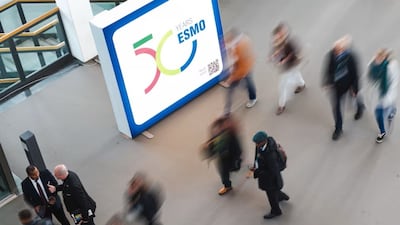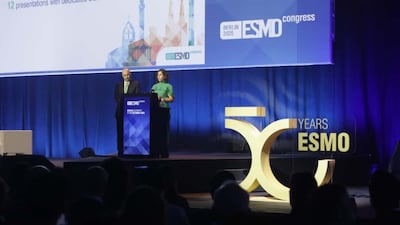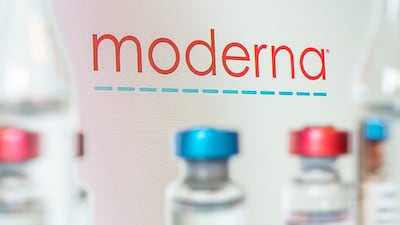ESMO
Terms like ‘game-changing’ and ‘transformational’ are regularly used by pharma companies but the data behind the latest approval for the Padcev/Keytruda combo for adults with muscle- invasive bladder cancer who are ineligible for cisplatin has been heralded by KOLs as exactly that.
While Amgen and Zai Labs await the results of a second Phase III trial before filing for approval, some hints as to what might have gone wrong for their FGFR2b-targeting monoclonal antibody in FORTITUDE-101 came with the full data presentation at ESMO this week.
RemeGen’s disitamab vedotin in combination with toripalimab significantly improved OS/PFS in Chinese patients with HER2-positive advanced urothelial carcinoma regardless of HER2 expression levels, meaning over 80% of patients with this condition could potentially benefit.
Data presented at the Berlin meeting highlight the potential of the company's cell therapy anzu-cel to redefine the treatment paradigm for uveal melanoma.
In a China-only Phase III trial, Sichuan Kelun-Biotech’s sac-TMT significantly cut the risk of death by 40% versus chemotherapy in the second-line treatment of non-squamous EGFR-mutated NSCLC. The ADC was administered at a higher dose than in Merck’s multiple Phase III trials of the same agent.
Exelixis’s novel kinase inhibitor zanzalintinib has shown promise in a metastatic colorectal cancer population but some experts want to see more data before passing judgement on whether it can become a new chemotherapy-free treatment option for these patients.
Positive first-in-human data for TUB-040 represent "a momentous milestone" for the German biotech, according to its CEO Dominik Schumacher.
Biokin/SystImmune’s anti-EGFRxHER3 ADC iza-bren achieved one primary and the key secondary objectives in a Phase III trial in Chinese patients with R/M NPC and its lower incidence of interstitial lung disease compared with other ADCs is also noteworthy.
The company presented detailed data at ESMO and said its Phase III trial might have reached statistical significance with a larger sample size.
Genmab is currently leading the field with next-generation folate receptor alpha ADCs, but big pharma rivals are looking to best it on efficacy regardless of tumor expression.
The two TROP2-targeted antibody-drug conjugates have each shown promising data as first-line therapy in metastatic triple-negative breast cancer patients who are not candidates for PD-1/PD-L1 inhibitors.
The company breaks new ground with Keytruda for platinum-resistant ovarian cancer and unveils promising Phase II data on its Daiichi-Sankyo-partnered ADC raludotatug deruxtecan.
The unprecedented results of DESTINY-Breast11 and DESTINY-Breast05 studies of AstraZeneca and Daiichi Sankyo’s blockbuster antibody-drug conjugate, Enhertu, point to it becoming the preferred treatment for many patients with high-risk early-stage HER2-positive breast cancer.
Positive data from the PSMAddition trial potentially doubles the number of prostate cancer patients eligible for treatment with the Swiss major’s big-selling radioligand therapy but a discussant at ESMO was not convinced by the study.
Roche is hopeful of getting a jump on its rivals by seeking a broad label for the oral SERD candidate, giredestrant, in advanced breast cancer on the back of significant efficacy in both all-comers and ESR1 mutant patients in the Phase III evERA study. Whether regulators will agree remains to be see
Data from the EV-303/KEYNOTE-905 trial show the potential for the combination of Astellas/Pfizer’s ADC and Merck’s PD1 blocker to redefine standard of care.
The largest financing for a private ADC developer globally will help the German biotech advance its two clinical- stage ADC candidates.
Lupin’s poster presentation at the upcoming ESMO Congress is set to highlight that its STING agonist candidate demonstrated safety in a Phase Ia trial. The question is whether it will be able to strike a deal like IFM Therapeutics did with Novartis or Mersana did with Merck KGaA
Encouraging overall survival data raise investor belief that domvanalimab can succeed in its ongoing Phase III study.
Looking to bolster its ailing respiratory virus business with an oncology success, Moderna will present early results from mRNA-4359 at ESMO.


















